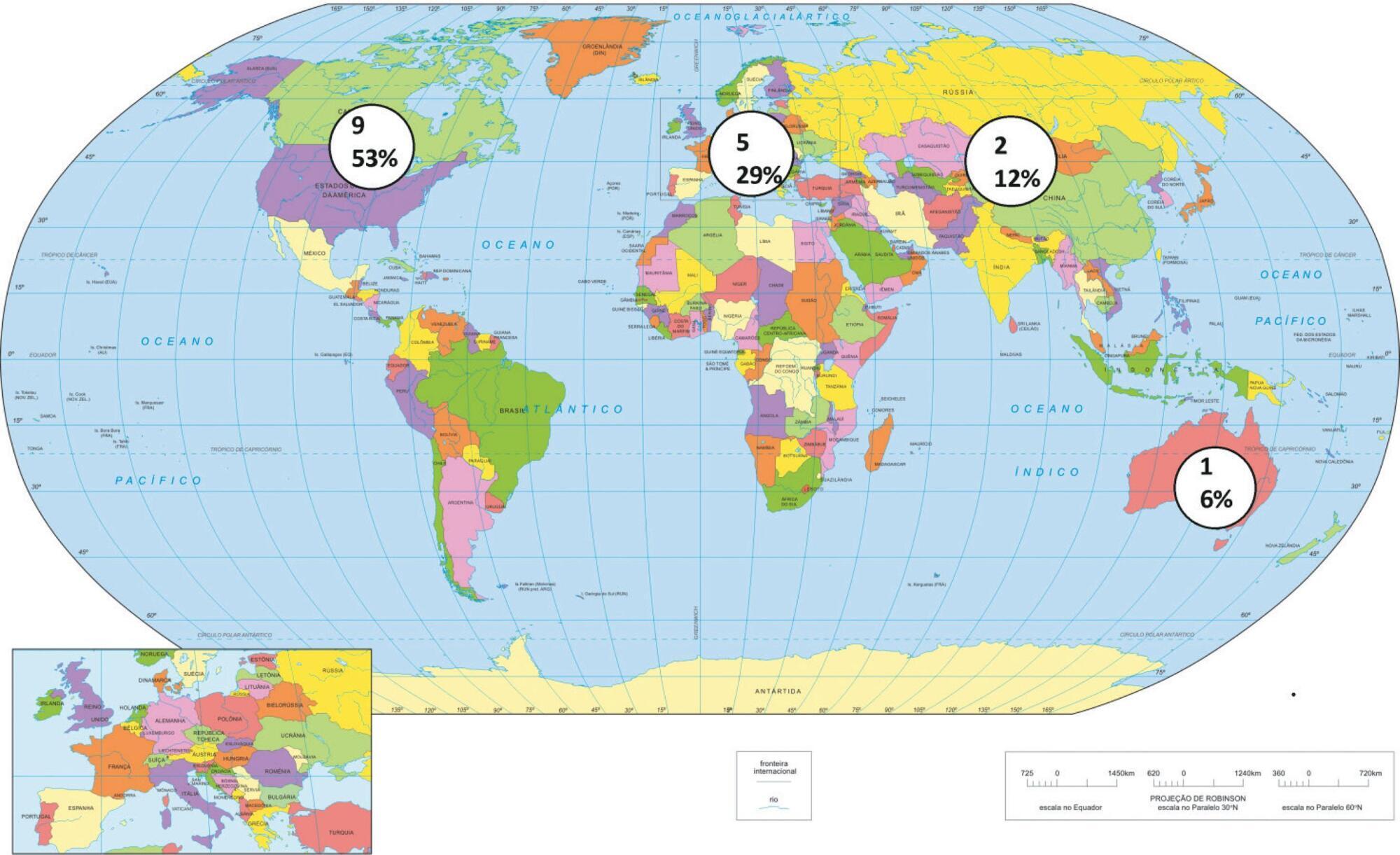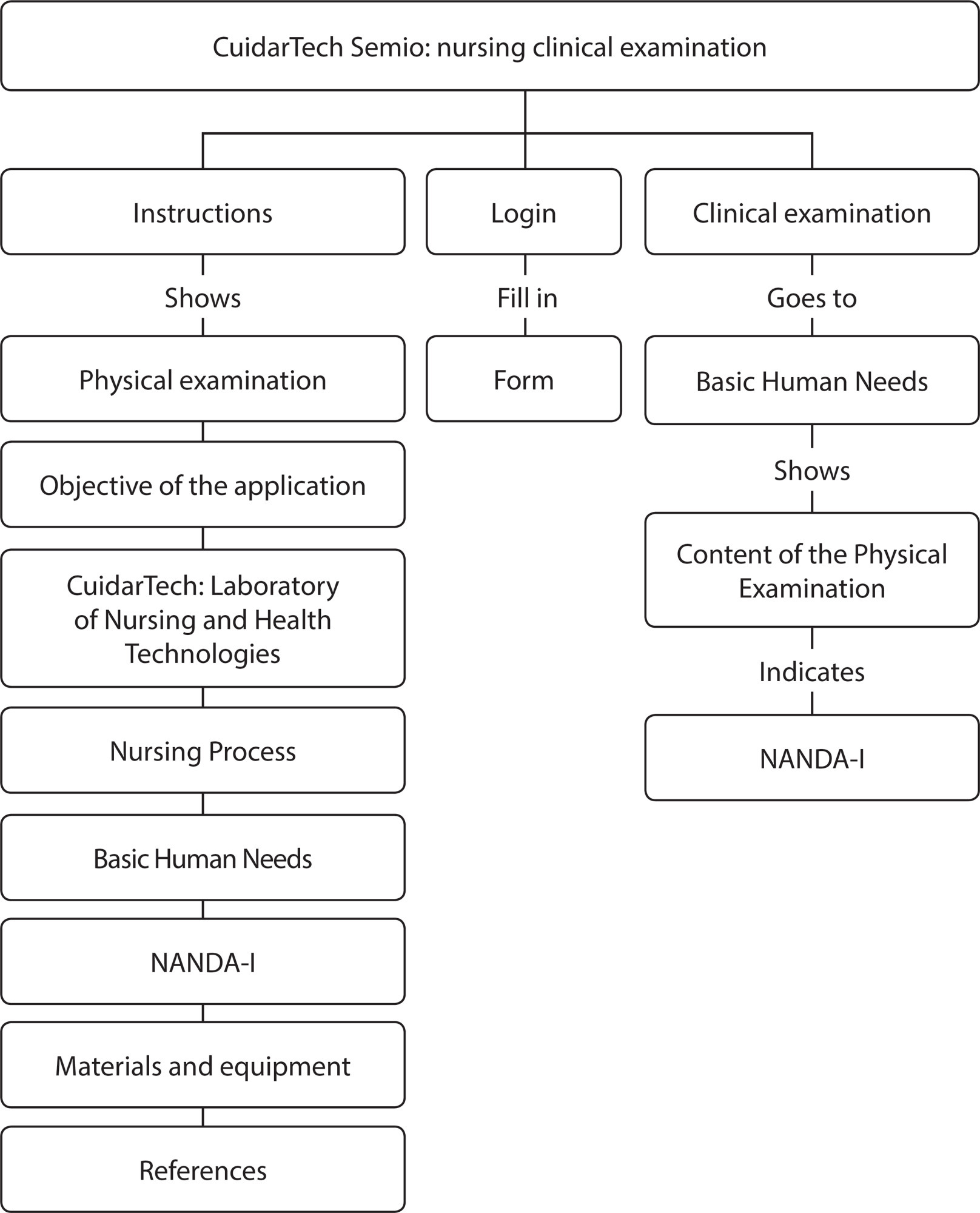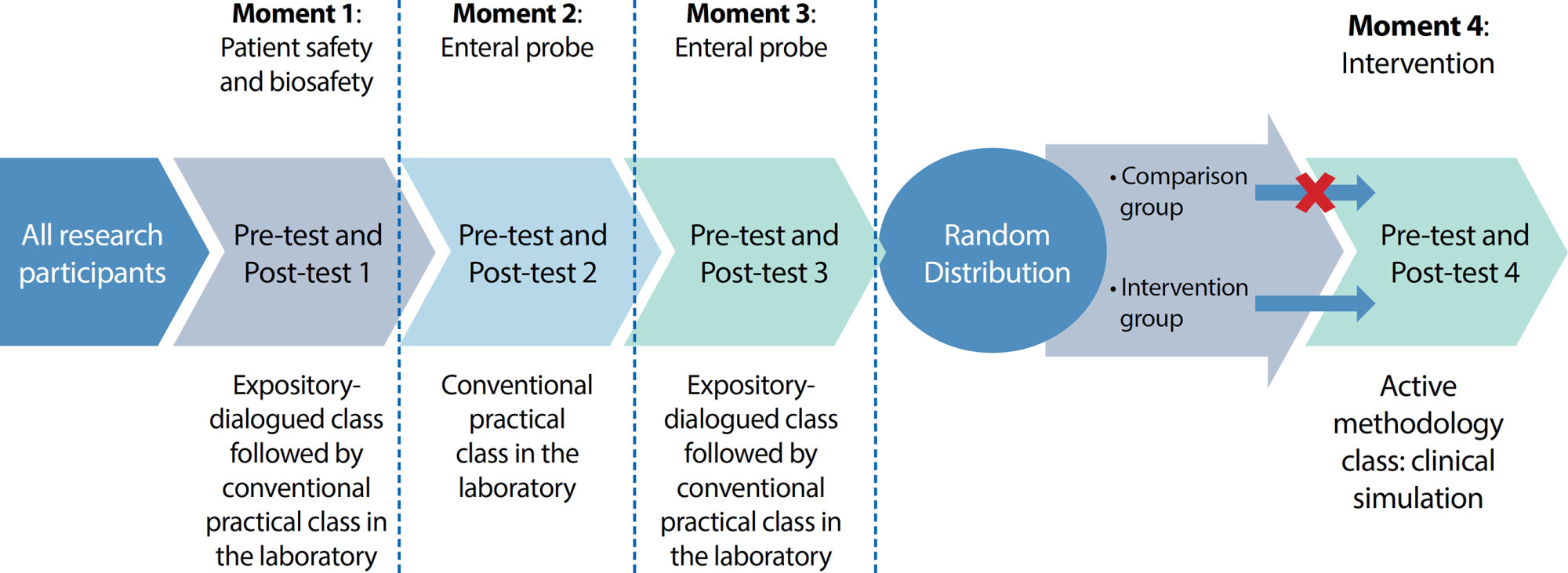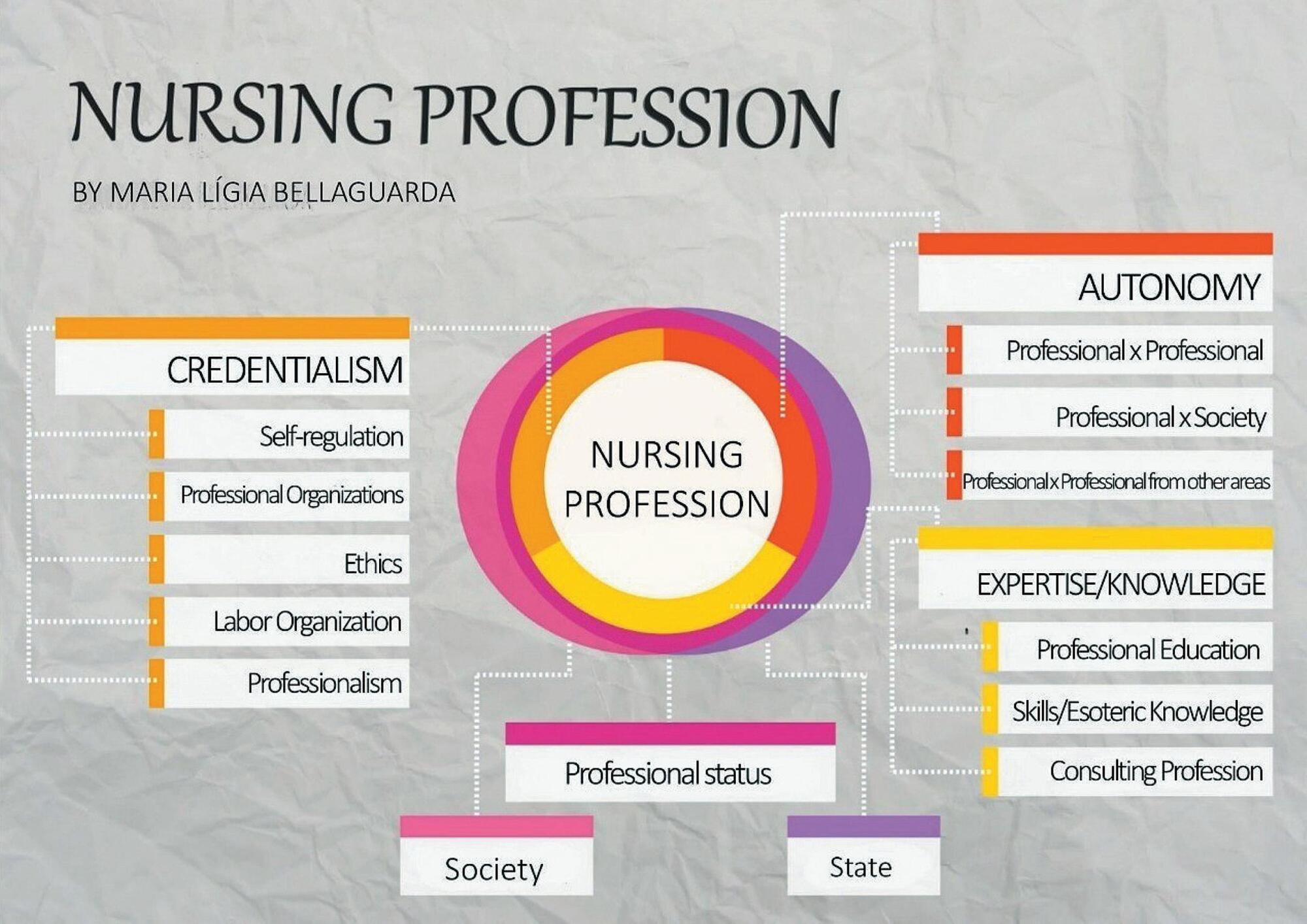-
RESEARCH
Nursing care by telehealth: what is the influence of distance on communication?
Revista Brasileira de Enfermagem. 2017;70(5):928-934
01-01-2017
Abstract
RESEARCHNursing care by telehealth: what is the influence of distance on communication?
Revista Brasileira de Enfermagem. 2017;70(5):928-934
01-01-2017DOI 10.1590/0034-7167-2016-0142
Views0See moreABSTRACT
Objective:
Evaluate the perception of nurses regarding interpersonal communication while providing care via telehealth.
Method:
Qualitative research realized with seven nurses working in telehealth in Brazil, the sample was determined by data saturation. A questionnaire with open questions was applied and then content analysis of the dialogues was conducted, focusing on thematic analysis.
Results:
Four categories emerged from the dialogues: Understanding the importance of communication; the interpersonal relationship interfering with communication; Communicating via technology; and Learning the communication process.
Final considerations:
The perception of nurses working in telehealth in Brazil is that technology has facilitated their professional practice; however, in relation to the communication process, they believe it is harder to communicate by telehealth, mainly due to difficulty in perceiving nonverbal signals. To overcome these difficulties, they agreed that interpersonal communication is a skill that must be acquired during their professional training.
-
RESEARCH
Neoliberalist influences on nursing hospital work process and organization
Revista Brasileira de Enfermagem. 2017;70(5):912-919
01-01-2017
Abstract
RESEARCHNeoliberalist influences on nursing hospital work process and organization
Revista Brasileira de Enfermagem. 2017;70(5):912-919
01-01-2017DOI 10.1590/0034-7167-2016-0092
Views0See moreABSTRACT
Objectives:
To describe and analyze the influence of the neoliberal economic and political model on the nursing hospital work process and organization.
Method:
Qualitative descriptive research, having as its scenery a university hospital. The subjects were 34 nursing workers. The data collection took place from March to July 2013, through semi-structured interview. The data treatment technique used was content analysis, which brought up the following category: working conditions precariousness and its consequences to the hospital work process and organization in the neoliberal context.
Results:
The consequences of neoliberalism on hospital work process and organization were highlighted, being observed physical structure, human resources and material inadequacies that harms the assistance quality. In addition to wage decrease that cause the need of second jobs and work overload.
Final considerations:
There is a significant influence of the neoliberal model on hospital work, resulting on working conditions precariousness.
-
RESEARCH
Nursing team’s conceptions about the families of hospitalized children
Revista Brasileira de Enfermagem. 2017;70(5):904-911
01-01-2017
Abstract
RESEARCHNursing team’s conceptions about the families of hospitalized children
Revista Brasileira de Enfermagem. 2017;70(5):904-911
01-01-2017DOI 10.1590/0034-7167-2016-0233
Views0See moreABSTRACT
Objectives:
to describe nursing team care and discuss the nursing team’s conception of companion families of hospitalized children. The study was based on the theoretical framework of Collière’s theory of nursing care identity.
Method:
this was a qualitative study with 14 members of a nursing team, conducted through an unstructured group interview. Thematic data analysis was employed.
Results:
habitual and repair care was delegated to families, regardless of the child’s clinical condition.
Final considerations:
the team’s official discourse about the families of hospitalized children, as recommended by the literature, refers to the family’s alterity and participation in care provision, with sights on discharge and defending family participation as beneficial to children. In practice, however, the nursing staff makes concessions about the presence of chaperoning families and delegates care.
-
RESEARCH
Innovation in nursing health care practice: expansion of access in primary health care
Revista Brasileira de Enfermagem. 2017;70(5):898-903
01-01-2017
Abstract
RESEARCHInnovation in nursing health care practice: expansion of access in primary health care
Revista Brasileira de Enfermagem. 2017;70(5):898-903
01-01-2017DOI 10.1590/0034-7167-2016-0131
Views0ABSTRACT
Objective:
analyze the reorganization of the health care practice of nurses as an innovative strategy for expansion of access in primary care.
Method:
qualitative and quantitative study, which interviewed 32 management and care nurses and collected documentary data from public reports of production of nursing consultations from 2010 to 2014, in a municipality in southern Brazil. Data processing for textual analysis was performed by IRAMUTEQ software; for simple descriptive statistical analysis, the program Excel 2013 was used.
Results:
in the innovative care practice class, associated with awareness of change, related to implementation of the FHS, its challenges and advantages, the following subclasses were identified: reorganization of schedules, nursing consultation, physical restructuring of BHUs, and shared consultation.
Final considerations:
the need to expand access to and valorization of care practice encourages the development of innovative strategies. The protagonism of care needs to be discussed in the various spaces so that each professional carry out the respective role with competence and efficacy.
Keywords:Access to Health ServicesHealth Care Practice ManagementNursingOrganizational InnovationPrimary Health CareSee more
-
EDITORIAL
The Nursing work and the construction of a democratic society
Revista Brasileira de Enfermagem. 2017;70(5):896-897
01-01-2017
Abstract
EDITORIALThe Nursing work and the construction of a democratic society
Revista Brasileira de Enfermagem. 2017;70(5):896-897
01-01-2017DOI 10.1590/0034-7167.2017700501
Views0In Brazil, the Nursing work is performed by an expressive contingent of workers, which – according to the last survey by the Brazilian Nursing Association – comprised 1,856,683 professionals, mostly women, distributed into three professional categories: Nurses, Nursing Technicians and Nursing Assistants, who work in public and private health care networks. With salaries lower than […]See more -
EDITORIAL
O trabalho em Enfermagem e a construção de uma sociedade democrática
Revista Brasileira de Enfermagem. 2017;70(5):896-897
01-01-2017
Abstract
EDITORIALO trabalho em Enfermagem e a construção de uma sociedade democrática
Revista Brasileira de Enfermagem. 2017;70(5):896-897
01-01-2017DOI 10.1590/0034-7167.2017700501
Views0No Brasil, o trabalho em enfermagem é realizado por expressivo contingente de trabalhadores, que, de acordo com o último levantamento realizado pela Associação Brasileira de Enfermagem, somava 1.856.683 profissionais, em sua maioria mulheres, distribuído em três categorias profissionais: Enfermeiros, Técnicos e Auxiliares de Enfermagem que atuam na rede pública e privada de saúde. Com baixos […]See more -
REFLECTION
Transcendence, historicity and temporality of being elderly: nursing reflection-using Heidegger
Revista Brasileira de Enfermagem. 2017;70(4):891-895
01-01-2017
Abstract
REFLECTIONTranscendence, historicity and temporality of being elderly: nursing reflection-using Heidegger
Revista Brasileira de Enfermagem. 2017;70(4):891-895
01-01-2017DOI 10.1590/0034-7167-2016-0275
Views0See moreABSTRACT
The objective is to reflect on historicity and temporality as paths for the transcendence of being elderly, based on the phenomenological concepts of Martin Heiddeger. A review of the concepts of transcendence, historicity and temporality was carried out in the work of Martín Heidegger, integrating them in the perspective of nursing for the elderly. The transcendence of the elderly adult is feasible by accessing the temporality of self in the path of its historicity to arrive at the understanding of itself that he has achieved: transcending, which is but a process of the Being itself. Being is time in itself existing in the world, existence given by the encounter of the past (to have been), present and future (becoming), the same encounter that determines the historicity of the Being. The encounter has been consummated and the Being is transcendence, with the understanding of the Being itself as a supreme point.
-
ORIGINAL ARTICLE
Validity of the TBApp mobile application for self-care management for people with tuberculosis
Revista Brasileira de Enfermagem. 2024;77(2):e20230195
06-14-2024
Abstract
ORIGINAL ARTICLEValidity of the TBApp mobile application for self-care management for people with tuberculosis
Revista Brasileira de Enfermagem. 2024;77(2):e20230195
06-14-2024DOI 10.1590/0034-7167-2023-0195
Views1See moreABSTRACT
Objectives:
to describe the validity process of the TBApp mobile application for self-care management for people with tuberculosis linked to Primary Health Care.
Methods:
methodological research developed with ten expert judges, carried out virtually. The application was assessed in relation to content and technology quality in seven domains (objectivity; structure and appearance; relevance; functionality; reliability; usability; and efficiency), using an instrument with a Likert scale.
Results:
TBApp was considered valid, relevant, functional, reliable and effective by expert judges. The objectives, structure and presentation and relevance domains presented an overall Content Validity Index of 0.93, and the functionality, reliability, usability and efficiency domains presented characteristics and sub-characteristics values greater than 0.80.
Conclusions:
TBApp is a creative and innovative tool that can be used by people with TB and disseminated in the scientific community.
-
Evolution of nursing teaching in the use of education technology: a scoping review
Revista Brasileira de Enfermagem. 2021;74:e20200422
05-21-2021
Abstract
Evolution of nursing teaching in the use of education technology: a scoping review
Revista Brasileira de Enfermagem. 2021;74:e20200422
05-21-2021DOI 10.1590/0034-7167-2020-0422
Views1See moreABSTRACT
Objective:
To identify and map the technological tools of information and communication to support the teaching learning process in Nursing teaching courses.
Methods:
This is a scoping review whose search was carried out in seven databases and in grey literature. After an initial analysis of the selection, 88 texts were read integrally, and 29 made up the final sample.
Results:
Virtual learning environment and object, simulation, hypermedia, and software or cellphone applications were the tools the nursing professors used the most. Studies highlight that the application of technology was important in the teaching-learning process, since it encouraged teaching based on safe care, motivating and developing abilities/competences, supported on significant, effective, flexible, and autonomous learning.
Conclusion:
The contribution of the technology for nursing formation stands out, but it should be highlighted that its employment must be critical, reflective, based on pedagogical theories and developed by trained professors.

-
ORIGINAL ARTICLE
Self-care of elderly people with diabetes mellitus and the nurse-patient interpersonal relationship
Revista Brasileira de Enfermagem. 2022;75(1):e20201257
10-01-2022
Abstract
ORIGINAL ARTICLESelf-care of elderly people with diabetes mellitus and the nurse-patient interpersonal relationship
Revista Brasileira de Enfermagem. 2022;75(1):e20201257
10-01-2022DOI 10.1590/0034-7167-2020-1257
Views1INTRODUCTIONChronic non-communicable diseases are the main causes of death and health problems in the world, causing about 41 million deaths each year, which corresponds to approximately 71% of all deaths. Among these diseases, diabetes mellitus has stood out due to the increase in its incidence and prevalence().Estimates indicate that 463 million people live with diabetes […]See more -
ORIGINAL ARTICLE
Nurses’ performance in palliative care: spiritual care in the light of Theory of Human Caring
Revista Brasileira de Enfermagem. 2022;75(1):e20210029
09-24-2022
Abstract
ORIGINAL ARTICLENurses’ performance in palliative care: spiritual care in the light of Theory of Human Caring
Revista Brasileira de Enfermagem. 2022;75(1):e20210029
09-24-2022DOI 10.1590/0034-7167-2021-0029
Views1See moreABSTRACT
Objectives:
to analyze nurses’ role in assisting patients in palliative care, with emphasis on the spiritual dimension, in the light of Theory of Human Caring.
Methods:
this is an exploratory, qualitative study, carried out in a hospital in João Pessoa, Paraíba, between August and December 2019, with 10 nurses. For data collection, semi-structured interviews were used. For analysis, we opted for content analysis.
Results:
the spiritual dimension of care is contemplated by several religious and spiritual practices. These are respected and encouraged by nurses, although there is difficulty in providing care for the spiritual dimension.
Final Considerations:
nurses have attitudes consistent with Jean Watson’s Theory and apply the Caritas Process elements during assistance to patients’ spiritual dimension in palliative care.
-
ORIGINAL ARTICLE
Adaptation and validation of an adult patient classification instrument with emphasis on the family dimension
Revista Brasileira de Enfermagem. 2023;76(2):e20220530
03-27-2023
Abstract
ORIGINAL ARTICLEAdaptation and validation of an adult patient classification instrument with emphasis on the family dimension
Revista Brasileira de Enfermagem. 2023;76(2):e20220530
03-27-2023DOI 10.1590/0034-7167-2022-0530
Views1ABSTRACT
Objectives:
to adapt and validate an instrument for classifying adult patients that emphasizes the family support network in the demand for nursing care.
Methods:
methodological study, carried out in three phases: adaptation of an instrument considering the reality of adult patients; content validation with seven experts and assessment of measurement properties (construct validity and internal consistency) with 781 hospitalized patients.
Results:
in content validation, the indicators reached the values established for the Content Validity Index (0.85-1.00). In the confirmatory factor analysis, the 11 indicators were distributed in three domains and presented average variance extracted and factor loading greater than 0.5. Composite reliability was greater than 0.7.
Conclusions:
the present study adapted and made available, with evidence of validity and reliability, an instrument for classifying adult patients that considers the family support network in the demand for nursing care.
Keywords:Factor AnalysisFamilyHospital Organization and AdministrationPatient-Centered CareValidation StudiesSee more
-
ORIGINAL ARTICLE
Guide for Systematization of Care and Nursing Process: educational technology for professional practice
Revista Brasileira de Enfermagem. 2023;76:e20210975
04-14-2023
Abstract
ORIGINAL ARTICLEGuide for Systematization of Care and Nursing Process: educational technology for professional practice
Revista Brasileira de Enfermagem. 2023;76:e20210975
04-14-2023DOI 10.1590/0034-7167-2021-0975
Views1ABSTRACT
Objective:
to elaborate and validate the content of a digital guide educational technology on Systematization of Nursing Care and Nursing Process.
Methods:
applied research of technological development, developed between 2020 and 2021, in three steps. First, a scoping review was carried out to elaborate the content. In the second step, the content was validated with 46 nurse judges selected for convenience. The minimum criterion of agreement among judges was 80%. The third step consisted of content organization and layout.
Results:
the guide content was elaborated from the Federal Nursing Council legislation, scientific articles and textbooks. Content was considered appropriate, relevant and organized by judges.
Final considerations:
the digital guide is an alternative that can contribute to the NP execution and implementation, supporting the planning and implementation of actions for quality of care.
Keywords:Educational TechnologyNursing ProcessNursing RecordsProfessional PracticeStandardized Nursing TerminologySee more
-
ERRATUM
ERRATUM
Revista Brasileira de Enfermagem. 2024;77(1):e2024n1e01
01-15-2024
Abstract
ERRATUMERRATUM
Revista Brasileira de Enfermagem. 2024;77(1):e2024n1e01
01-15-2024DOI 10.1590/0034-7167.20247701e01
Views1In the article “The ethics of nursing care for transgender people”, with DOI number: , published in Revista Brasileira de Enfermagem, 2023;76(Suppl 3):e20220797, in authorship:Where it read:[…]See more -
REVIEW
Telenursing contributions in Primary Health Care in the COVID-19 pandemic context: an integrative review
Revista Brasileira de Enfermagem. 2024;77(5):e20240093
11-22-2024
Abstract
REVIEWTelenursing contributions in Primary Health Care in the COVID-19 pandemic context: an integrative review
Revista Brasileira de Enfermagem. 2024;77(5):e20240093
11-22-2024DOI 10.1590/0034-7167-2024-0093
Views1See moreABSTRACT
Objective:
to identify telenursing contributions in Primary Health Care during the COVID-19 pandemic.
Methods:
an integrative literature review, conducted between January and August 2022 in the PubMed, CINAHL, LILACS, BDENF, Scopus, WoS, EMBASE and SciELO databases. A total of 493 studies was found, 62 were read in full, and of these, 16 were selected. For analysis, a dynamic reading of the studies and synthesis of the main results were carried out.
Results:
the main results highlighted telenursing practice as a challenge for professionals and the population. Among the contributions and positive points and aspects that require improvement, practice showed promise when considered in a post-pandemic scenario.
Final considerations:
through telenursing, the population’s access to Primary Health Care was guaranteed in the face of the COVID-19 pandemic. However, a critical look at current technological advances in healthcare is necessary.

-
REVIEW
Mental health interventions implemented in the COVID-19 pandemic: what is the evidence?
Revista Brasileira de Enfermagem. 2021;74:e20200635
06-11-2021
Abstract
REVIEWMental health interventions implemented in the COVID-19 pandemic: what is the evidence?
Revista Brasileira de Enfermagem. 2021;74:e20200635
06-11-2021DOI 10.1590/0034-7167-2020-0635
Views0See moreABSTRACT
Objective:
to map the evidence on mental health interventions implemented during the COVID-19 pandemic.
Method:
this scoping review was carried out in the MEDLINE/PubMed, SCOPUS, Web of Science, PsycINFO, and Science Direct databases and in the medRxiv, bioRxiv, and PsyArXiv preprints servers using the descriptors “Covid-19”, “coronavirus infection”, “coronavirus”, “2019-nCoV”, “2019 novel coronavirus disease”, “SARS-CoV-2”, “health personnel”, “general public”, and “mental health”.
Results:
eight articles were selected and categorized into mental health interventions for the population, among which mental health interventions were for people diagnosed with suspicion/confirmed COVID-19 and mental health interventions for health professionals.
Conclusion:
telemonitoring, virtual games and strategies focused on social support and muscle relaxation techniques, characterized as non-pharmacological and low-cost, were shown as interventions, which, since they are effective, need to be encouraged and included in mental health care practices.

-
Nursing performance in robotic surgeries: integrative review
Revista Brasileira de Enfermagem. 2019;72(3):795-800
06-07-2019
Abstract
Nursing performance in robotic surgeries: integrative review
Revista Brasileira de Enfermagem. 2019;72(3):795-800
06-07-2019DOI 10.1590/0034-7167-2018-0426
Views0ABSTRACT
Objective:
To know the scientific production on the performance of the nursing staff in robotic surgeries, identifying the role of the nurse in the three perioperative periods.
Methods:
Integrative review, search in the databases National Library of Medicine, National Institutes of Health, Scientific Electronic Library Online and Biblioteca Virtual em Saúde, performed from June to September, 2017; 17 selected articles met the inclusion criteria.
Results:
Most articles were published in foreign journals in English, nine in the United States, classified with evidence level of 4 and 5. The role of nursing in the perioperative period was identified, related mainly to patient safety. The most mentioned perioperative period in the articles was the intraoperative, with greater concern in the positioning of the patient.
Conclusion:
The nursing performance and patient safety in robotic surgeries are similar to the ones in major surgeries, requiring from the patient a specific knowledge on the setting and preparation of the robot.
Keywords:Nurse's RolePerioperative NursingRoboticsSurgical Procedures, OperativeTechnological DevelopmentSee more
-
ORIGINAL ARTICLE
“Waiting for a miracle”: Spirituality/Religiosity in coping with sickle cell disease
Revista Brasileira de Enfermagem. 2019;72(6):1554-1561
10-21-2019
Abstract
ORIGINAL ARTICLE“Waiting for a miracle”: Spirituality/Religiosity in coping with sickle cell disease
Revista Brasileira de Enfermagem. 2019;72(6):1554-1561
10-21-2019DOI 10.1590/0034-7167-2018-0635
Views0See moreABSTRACT
Objective:
To understand spirituality/religiosity as experienced by people with sickle cell disease, and its influence on coping with the disease.
Method:
A qualitative, descriptive, and exploratory study conducted in the State of Bahia. Twenty-nine respondents participated in semi-structured interviews. Content analysis was used to analyze the empirical material.
Results:
Individuals with sickle cell disease experience spirituality/religiosity motivated by their hope for a miracle, and fear of death; among their rites are: reading religious materials, individual and group prayer, and attendance at worship services. The effects on their health include: comfort by means of coping by comparing two evils, anxiety relief, social support, and lifestyle changes; however, spirituality/religiosity may be impaired.
Final considerations:
This study demonstrates the need to qualify health professionals to address spiritual issues of these individuals during illness, with the aims of diagnosing suffering and anguish, and providing care, comfort and strengthening of the spiritual bonds of these individuals.
-
ORIGINAL ARTICLE
Construction and validation of a mobile application for development of nursing history and diagnosis
Revista Brasileira de Enfermagem. 2020;73:e20190674
12-21-2020
Abstract
ORIGINAL ARTICLEConstruction and validation of a mobile application for development of nursing history and diagnosis
Revista Brasileira de Enfermagem. 2020;73:e20190674
12-21-2020DOI 10.1590/0034-7167-2019-0674
Views0ABSTRACT
Objectives:
to describe the construction and validation process for a mobile application for development of the nursing history and diagnosis.
Methods:
methodological study conducted in 2018 in three stages: content creation, based on the Basic Human Needs categories and nursing diagnoses; content assessment by nine nursing judges, with calculation of the content validity index; and construction of the application, which included definition of the requirements, a conceptual map, implementation and prototyping options, tests and implementation.
Results:
the application was organized by sections: Grouped Basic Human Needs, Cranial pair tests, Clinical assessment scales and Additional tests. Two section were adjusted according to the judges’ suggestions.
Final Considerations:
it is the first application produced in Brazil based on the Basic Human Need categories, which enables quick access to information, concepts and typical nomenclatures of semiology, recording of clinical data and definition of nursing diagnoses.
Keywords:Educational TechnologyMobile ApplicationsNursing InformaticsNursing ProcessPhysical ExaminationSmartphoneSee more
-
ORIGINAL ARTICLE
Factors associated with vulnerability and fragility in the elderly: a cross-sectional study
Revista Brasileira de Enfermagem. 2022;75(2):e20200399
10-01-2022
Abstract
ORIGINAL ARTICLEFactors associated with vulnerability and fragility in the elderly: a cross-sectional study
Revista Brasileira de Enfermagem. 2022;75(2):e20200399
10-01-2022DOI 10.1590/0034-7167-2020-0399
Views0See moreABSTRACT
Objectives:
to assess factors associated with vulnerability and fragility in the elderly.
Methods:
crosssectional study with 384 elderly people in Fortaleza, Ceará. The Vulnerable Elders Survey and Clinical-Functional Vulnerability Index – 20 were used. Chi-square and Fisher’s exact tests were used for associations. In the analysis of the combined influence of risk factors, the stepwise logistic regression and multinomial regression methods were adopted.
Results:
251 (65.4%) non-vulnerable and 133 (34.6%) vulnerable elders. From the vulnerable elders analyzed, 42 (30.9%) are at high risk for frailty. Factors associated with vulnerability: age, gender, presence of comorbidities, hypertension, diabetes, osteoporosis and use of polypharmacy. There is a 30% increase in the chance of vulnerability for each additional drug. Physical activity reduces the chance of vulnerability by 60%. Factors associated with frailty: educational level; self-perception of health; comorbidities; polypharmacy.
Conclusions:
it is important to pay attention to the presence of arterial hypertension, osteoporosis, polypharmacy, and encourage the practice of physical activity.
-
ORIGINAL ARTICLE
Caring ability, burden, stress and coping of family caregivers of people in cancer treatment
Revista Brasileira de Enfermagem. 2019;72(6):1541-1546
10-21-2019
Abstract
ORIGINAL ARTICLECaring ability, burden, stress and coping of family caregivers of people in cancer treatment
Revista Brasileira de Enfermagem. 2019;72(6):1541-1546
10-21-2019DOI 10.1590/0034-7167-2018-0605
Views0See moreABSTRACT
Objective:
To analyze the association between the caring ability and the burden, stress and coping of family caregivers of people in cancer treatment.
Method:
A cross-sectional study with 132 family caregivers. The following instruments were applied: a characterization instrument, the Caring Ability Inventory, the Zarit Burden Interview, the Perceived Stress Scale, and the Brief COPE. The Spearman Correlation was used with significance ≤5%.
Results:
There were significant and positive correlations between total caring ability and: burden – interpersonal relationship (p=0.03); stress (p=0.02) and maladaptive coping (p=0.00); and inversely proportional correlations with problem-focused coping (p=0.03). The courage had inversely proportional correlation with: self-efficacy (p=0.03), interpersonal relationship (p=0.00), stress (p=0.04) and maladaptive coping (p=0.00). The knowledge had significant and positive correlation with problem-focused coping (p=0.00), adaptive coping (p=0.01), and inverse correlation with stress (p=0.02).
Conclusion:
The level of caring ability correlates with levels of stress and burden, and with the type of coping strategy used by family caregivers.
-
ORIGINAL ARTICLE
Clinical simulation as a Nursing Fundamentals teaching method: a quasi-experimental study
Revista Brasileira de Enfermagem. 2022;75(2):e20201155
10-18-2022
Abstract
ORIGINAL ARTICLEClinical simulation as a Nursing Fundamentals teaching method: a quasi-experimental study
Revista Brasileira de Enfermagem. 2022;75(2):e20201155
10-18-2022DOI 10.1590/0034-7167-2020-1155
Views0See moreABSTRACT
Objectives:
to evaluate students’ knowledge gain after the implementation of clinical simulation in Nursing Fundamentals disciplines.
Methods:
a quasi-experimental intervention was carried out with 60 students, distributed in comparison and intervention groups, who underwent traditional teaching and traditional teaching associated with simulated teaching, respectively. Pre-test and post-test instruments were applied to both groups.
Results:
after analyzing the students’ performance through the applied instruments, both groups had a cognitive evolution along with the taught content, however, when compared, the intervention group obtained a higher knowledge gain than the comparison group (p = 0.016), demonstrating progressive and increasing improvement with the use of the methodology.
Conclusions:
simulated teaching significantly helps students in gaining technical-cognitive knowledge. Therefore, it is recommended to adhere to the use of this methodology for teaching Nursing Fundamentals.

-
ORIGINAL ARTICLE
Eliot Freidson’s sociology of professions: an interpretation for Health and Nursing
Revista Brasileira de Enfermagem. 2020;73(6):e20180950
08-10-2020
Abstract
ORIGINAL ARTICLEEliot Freidson’s sociology of professions: an interpretation for Health and Nursing
Revista Brasileira de Enfermagem. 2020;73(6):e20180950
08-10-2020DOI 10.1590/0034-7167-2018-0950
Views0See moreABSTRACT
Objectives:
to analyze theoretical conceptions of Eliot Freidson’s Sociology of Professions scoped on health and nursing professions.
Methods:
Eight nurses were interviewed, all involved in the development of the professional Council on the timeframe from 1975 to 1986. Documental resources were Laws, Ordinances, Resolutions, Reports, Meeting Minutes and Public Deeds. Information was organized as from literature and Eliot Freidson’s conceptions, and thematic content analysis was carried out.
Results:
the concepts authored by Eliot Freidson allowed for the development of a concept chart that portrays the nursing profession and that may be expanded for the other occupations in the health field, in consonance with professional organization in the country.
Final Considerations:
Eliot Freidson’s framework, in interpretation for nursing, consolidates the profession with relative autonomy, expertise by Nursing Care Systematization and credentialism by professional normalizations.

Search
Search in:
Nuvem de Tags
Aged (144) Atenção Primária à Saúde (239) COVID-19 (104) Cuidados de Enfermagem (269) Educação em Enfermagem (151) Educação em Saúde (139) Enfermagem (930) Estudos de Validação (131) Health Education (144) Idoso (208) Mental Health (149) Nursing (987) Nursing Care (306) Patient Safety (151) Primary Health Care (284) Qualidade de Vida (104) Quality of Life (106) Saúde Mental (145) Segurança do Paciente (150) Validation Studies (108)



